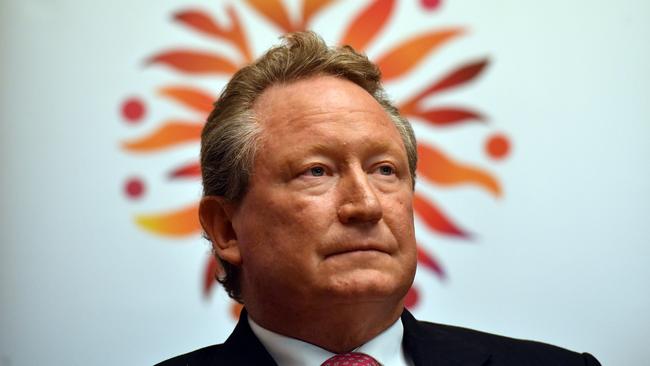Andrew Forrest joins green groups to oppose Norway’s plan for Bight oil drill
Andrew Forrest has implored Norway’s government to abandon planned oil drilling in the Great Australian Bight.

Mining billionaire Andrew Forrest has implored Norway’s government to abandon planned oil drilling in the Great Australian Bight, warning he is prepared to launch a massive campaign to safeguard the ecologically sensitive area.
Mr Forrest — who built his fortune mining iron ore in Western Australia’s Pilbara — has joined a host of green groups including the Wilderness Society in opposing plans by the Norwegian government-controlled Equinor to conduct oil exploration in the Bight by the end of 2020.
The chairman of Australia’s third largest iron ore producer, Fortescue Metals Group, said the Nordic nation may damage its “excellent environmental reputation” and compared the risk with scandals faced by Brazil’s Vale, which suffered a deadly mining dam disaster in January, according to an interview with a Norwegian newspaper.
A big financial campaign could be launched against Equinor if it doesn’t change its plans, according to the interview.
The entrepreneur’s family charity Minderoo Foundation recently started the Flourishing Oceans initiative and says drilling for oil in the Bight presents “an unacceptable risk to an irreplaceable ecosystem”.
Minderoo said while it was not opposed to responsible resource extraction, the risks of drilling in the pristine Bight made exploration or oil operations unacceptable.
The Bight’s deep water holds one of the last untested Australian oil exploration frontiers. Oil major Chevron has said it could produce on a similar scale to Bass Strait’s once-great oilfields.
BP pulled out in 2016 after a protracted approvals process, fierce green opposition and depressed oil prices, followed by Chevron the year after.
Equinor, the renamed Statoil, has taken up one of BP’s planned wells. Equinor has previously said that over four decades as one of the world’s biggest oil producers it had made a global name for itself by collaborating with fishing and tourism.
Mr Forrest had hoped to use his trip to Oslo to meet with Equinor executives, but no time was available.
“First he raised issues at a government level and then he asked if people at the government level would introduce him to people at Equinor and unfortunately that just didn’t work out,” Flourishing Oceans chief executive Brigitte Smith told The Australian.
“He was only in Norway for a short period.”
The broader reason for his trip was to gather allies to help Minderoo and Flourishing Oceans build connections in the fight to safeguard marine ecologies.
“We’re trying to find allies to preserve the world’s oceans and he wanted to meet with some significant groups in Norway who are working on that both from the perspective of plastics and fishing,” Ms Smith said.
“That was the original purpose of his trip to Norway.”
More than 30,000 people lodged submissions over Equinor’s plans to drill in the Bight to the Australia’s National Offshore Petroleum Safety and Environmental Management Authority.
Equinor said a large number were general statements that do not offer constructive feedback.
“We also see that many statements were influenced by material circulating online, which grossly misrepresent both the risk and consequences of a major oil spill,” Equinor said yesterday.
“It is unfortunate that this misleading information has resulted in expressions of genuine fear and concern in many of the submissions.
“We call on all parties in this public discussion to hold themselves to a high standard of factual and balanced information.”
Last year the Australian Petroleum Production and Exploration Association released a report it commissioned from ACIL Allen on the potential economic impact of discovering an oil province in the Bight.
Based on a 1.9 billion barrel resource that Wood Mackenzie in 2015 estimated could be in the Bight, Australian GDP could be boosted by $6bn a year for 40 years, ACIL said. If the Bight has the same resources as Bass Strait, it could be $19bn a year.
Wood Mackenzie has since reduced its estimate to 1.4 billion barrels.


To join the conversation, please log in. Don't have an account? Register
Join the conversation, you are commenting as Logout